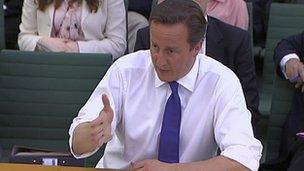UK doesn't need Washington-style civil service, says Cameron
- Published

The prime minister rejected a move towards a more politicised civil service
The UK does not need to a politicised civil service like those of France and the US, David Cameron has argued.
He said plans brought forward by the government were "radical" but accepted they preserved a permanent, impartial civil service.
The PM told a committee of senior MPs the civil service needed to be "fleeter of foot" and less hierarchical.
He said discussions leading up to the publication of the reform plan had been "lively".
In June, Cabinet Office minister Francis Maude published a package of reforms to the civil service, including plans for putting the bottom 10% of staff on probation and fired after a year if they fail to improve and ministers being given the power to choose who runs departments.
The planned changes come against a backdrop of deep cuts and job losses across Whitehall - and are likely to be resisted by civil service unions.
'Right measures'
Mr Cameron said: "I think the changes we are proposing are quite radical. I think there are some radical elements in here but I don't want us to fundamentally change the system from ministerial accountability with a permanent civil service to some different French or American system."
Asked whether he thought the reforms would address the concerns of ministers, Mr Cameron said he thought they would.
He said: "Obviously there was a lively debate. Some wanted it to go further. Some might have wanted it to go less far. I think it is the right set of measures."
Mr Cameron was addressing the Liaison Committee, made up of chairmen of the Commons select committees which scrutinise government departments.
The prime minister rejected suggestions that his adviser on the ministerial code, Sir Alex Allan, should have the power to launch his own inquiries.
It followed criticism of Mr Cameron's decision not to refer Culture Secretary Jeremy Hunt to Sir Alex over his handling of News Corp's takeover bid for BSkyB.
He said: "The ministerial adviser is there to advise. He gives the advice and the prime minister makes the decision."
Mr Cameron said it was inevitable there would be criticism when ministers were or were not referred, and it was right that the prime minister should be accountable to Parliament in such cases.
He defended the decision not to refer Mr Hunt, but to refer Conservative Party co-chairman Baroness Warsi, saying the Leveson Inquiry into media standards was already looking into issues of Mr Hunt's conduct.
Baroness Warsi was cleared of any serious breach of the ministerial code over an official trip to Pakistan.
Sir Alex found she was guilty of only a "minor" breach for failing to declare she had been accompanied by her business partner.
- Published12 June 2012
- Published18 June 2012
- Published24 May 2012
- Published11 May 2012